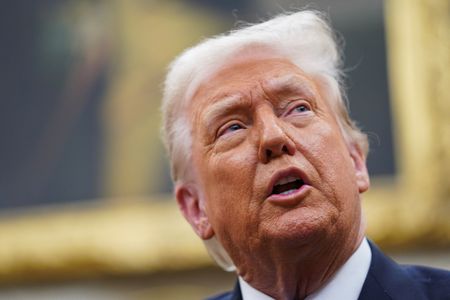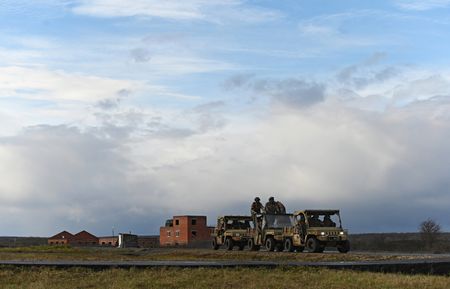By Andrey Sychev, Sarah Marsh
BERLIN (Reuters) -Germany could face months of political uncertainty after the federal election on Feb. 23 as the winning party will almost certainly have to form a coalition to secure a majority.
Here is a summary of the most likely coalitions and the compromises that will be necessary to reach agreement:
GRAND COALITION (Conservatives and Social Democrats)
Germany’s next chancellor looks set to be Friedrich Merz, whose opposition conservative CDU/CSU bloc is far ahead in the polls, but he will need a partner, possibly two. A so-called grand coalition of the two big centrist parties, the CDU/CSU and Chancellor Olaf Scholz’s centre-left Social Democrats (SPD) is seen as the most likely election outcome.
The SPD and CDU/CSU have already governed together four times since World War Two – three times under the leadership of former conservative Chancellor Angela Merkel.
Merz, however, has moved the bloc further to the right, taking a tougher stance on migration than Merkel and a more pro-market position on the economy.
The CDU/CSU wants broad tax cuts while the SPD wants to raise taxes for high-income earners and revive a wealth tax.
That means both could struggle to agree on deeper reforms, except a possible easing of the debt brake.
Probability: 60% according to the Eurasia Group.
KIWI (Conservatives, Greens)
A “Kiwi” coalition of the CDU/CSU and the Greens – named because of their respective black and green colours – is another possibility, although considered less likely. The two may not achieve a majority.
While they share some foreign policy views such as the need to provide more decisive support to Ukraine, they lie far apart on domestic policy and in particular migration.
That rift deepened last month when Merz chose to pass a motion urging a crackdown on irregular migration with support of the far-right Alternative for Germany (AfD). The Greens were among his most strident critics.
Markus Soeder, head of the CSU Bavarian sister party of the CDU, has frequently ruled out a Kiwi coalition.
It would be an unprecedented alliance at national level although the two govern together in three German states.
Probability: 15% according to the Eurasia Group.
KENYA (Conservatives, Social Democrats, Greens)
Scholz’s three-way coalition, the first in Germany in decades, collapsed due to infighting last November. But Merz may be forced to find two partners if some of the smaller parties like the Free Democrats (FDP) and far-left Die Linke reach the 5% threshold to win seats, fragmenting the allocation.
If no two larger parties can form a majority, the CDU/CSU, SPD and Greens could decide to form a so-called “Kenya” coalition, as their colours match those of the Kenyan flag.
Such coalitions have only occurred rarely at state level.
Probability: 10% according to the Eurasia Group.
GERMANY (Conservatives, Social Democrats, Free Democrats)
Another unlikely three-way combination could be the “Germany” coalition of CDU/CSU, SPD and FDP, named after the black, red and gold colours of the German flag.
It would be hard for the FDP and SPD to find common ground as a row over the budget between Scholz and FDP head Christian Lindner, who was then finance minister, led to the collapse of the three-way coalition and triggered snap elections.
Probability: 10% according to the Eurasia Group.
MINORITY GOVERNMENT
Some German states have had minority governments which seek different partners for each piece of legislation.
However, this has never happened at the start of a new legislative period on a federal level, only after a coalition has imploded, due to fears of the instability it could create.
Some politicians though are urging parties to consider this option given how complicated it is becoming to form a coherent coalition.
Merz himself said in a 2017 interview that parties should not exclude the possibility of a minority government, although he has not commented on the issue lately.
WHAT ABOUT THE AFD?
All other parties have ruled out forming a coalition with the AfD, which is the second most popular party according to opinion polls. The strength of the party is another factor set to complicate coalition building and securing a parliamentary majority.
(Reporting by Andrey Sychev and Sarah Marsh; Additional reporting by Andreas RinkeEditing by Alexandra Hudson)









